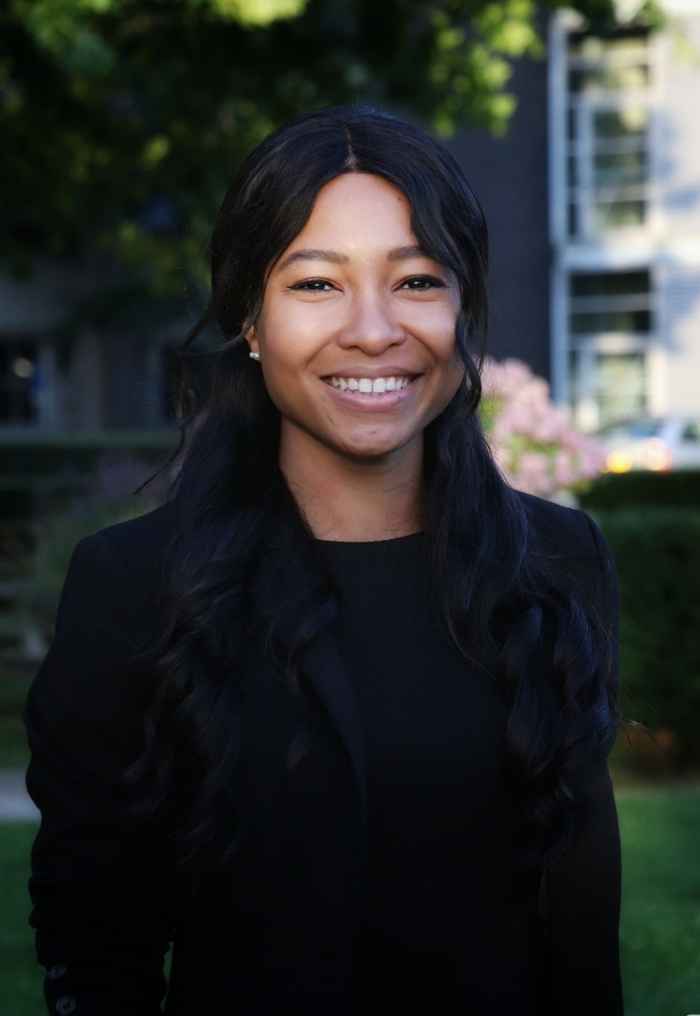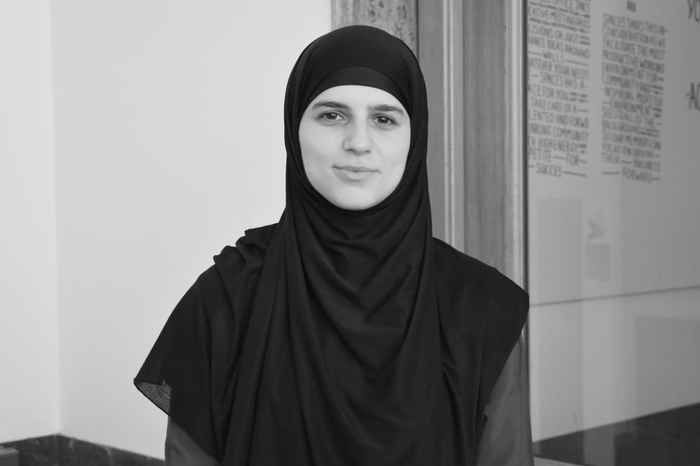Two UvA students receive ECHO Award 2020
9 December 2020
Minister of Education, Culture and Science, Ingrid van Engelshoven, announced the four winners in the categories HBO, WO, Science & Technology and Loyens & Loeff Law & Tax. In addition to the two UvA students, Riiziane Golamun of The Hague University of Applied Sciences won an Echo Award HBO and Süleyman Tosun, a student at the Vrije Universiteit, won an ECHO Loyens & Loeff Law & Tax Award.
An independent jury, chaired by Kathleen Ferrier, chairwoman of the Dutch Unesco Commission, elected the four winners. By winning, these students a fully covered six-week summer course at UCLA in the United States.
The University of Amsterdam spoke to its winning students about their achievements and what winning the award means to them.

Priscilla Maria, master’s student in Medicine
Can you tell us a little more about everything you're involved in?
‘I have been tutoring secondary school pupils since I was 19 years old. I am also a member of an association of doctors that was founded to improve the quality of healthcare on the Dutch Caribbean islands (AMA). We hold an annual symposium with the Ministry of Health, Welfare and Sport, hospital directors and anyone interested in healthcare on the islands. I have held various positions within the AMA, including a role as secretary on the board and as chairman of the lecture committee, which organises the symposium.
In cooperation with the Writer's Club of the AMA, I published an article in the Pan-American Journal of Public Health. It was about COVID-19 management on the islands and the unique problems they face. I am also a member of the Healthcare Leadership Academy in England. Oh, and I've only just heard that I'm also allowed to do my PhD during my Master's.’
What is your vision? What do you aim for?
‘I want to improve healthcare for everyone in the Netherlands, including the Dutch Caribbean islands, and make it more inclusive. I have such a passion for healthcare and education. I am working on a book for healthcare professionals to provide an overview of linguistic and cultural differences that are relevant to healthcare professionals so that we can improve the communication between doctor and patient. Communication in healthcare is extremely important and linguistic and cultural differences have a major impact on communication.’
How does your vision relate to your own background? Does your vision come from things you have experienced yourself?
‘I often give an example from my secondary school years. I went to school on Curaçao and I had a friend who was very intelligent, but didn't speak Dutch very well. He was wrongly evaluated as unintelligent for that reason. I think such a stamp is unfair, because a lack of language skills doesn't mean you're not intelligent and I've seen this way of thinking a lot more often. When I moved to the Netherlands, I also noticed that I was struggling with a language barrier, which had to do with how the language I knew and spoke well on Curaçao (Dutch) was used differently in the cultural context of the Netherlands. Language is more than words, but tells a story about culture and habits. In the Netherlands, for example, people are much more direct in the way they speak than on Curaçao.’
You said in yesterday's broadcast that you speak seven and a half languages and want to be able to speak ten in the end. Why is that?
‘Yes, I even thought about it and it's eight and a half! Many people grow up quadrilingually on Curaçao: in Dutch, Papiamento, English and Spanish. We actually speak all four languages interchangeably. Besides that, my mother is Surinamese so I grew up speaking an extra language. I was taught French in secondary school and I continued by learning Portuguese and Mandarin when I came to the Netherlands. Italian counts as half a language, which is only because I understand it but don’t speak it. German, Arabic and sign language are on my list of languages I still want to learn. Learning ten languages was a goal I set when I was younger. My current motivation for learning languages comes from the realisation that each language also comes with its own way of thinking.’
Which of your achievements are you most proud of?
‘The pupils I tutor! Because their marks have improved so much ever since I’ve been tutoring them. This proves to me that every student or pupil can achieve the best results with the right guidance. As a student, I have the same experience with Professor Ravesloot of the AMC. I really want to do a shout-out to him! He’s really there for all students and motivates us greatly.
I am also proud of the Caribbean Healthcare Symposium that we organise with the AMA because it makes conversations happen that normally don’t take place, publicly or at all.’
What does winning the award mean to you?
‘I enjoyed getting recognition for my perseverance after everything I've been through, but I suddenly understood why people get sad when they win something because it made me think about all the things I’ve had to endure to get there. I think it's great that there is such an organisation as ECHO, that brings people together. This win has definitely motivated me even more to ‘’go get it’’. I am also really looking forward to being able to evolve as a doctor, connector and role model at UCLA.’
What do you think of initiatives like the ECHO Award?
‘Everyone is grateful to the organisation for the platform it offers. I don't want to be seen as an exception, which is why I am glad that ECHO is showing that there is such a large group of ‘’exceptions’’. I am happy that ECHO is there to provide role models to people from non-Western backgrounds.’

Marwa Ahmed, master's student in Biomedical Sciences
Can you tell us a little more about everything you're involved in?
Can you tell us a little more about everything you're involved in?
‘I am on the Diversity Sounding Board of the Faculty of Science. This sounding board consists of students and staff to support the Diversity Officer of the Faculty of Science and to deal with other diversity and inclusion initiatives. I have been a Student Assistant to the Faculty Diversity Officer (FDO) of the Faculty of Science since September 2019. In this position, I help the FDO to increase diversity and inclusion at the faculty.
A year ago, the Faculty of Science and the Diversity Talks Foundation, received funding to set up a Student Impact Centre (SIC). Due to my work for the FDO, I joined the project team of the SIC. At the SIC, we provide financial support for initiatives that stimulate the social involvement of Faculty of Science students and, thus, contribute to important discussions about diversity and inclusion. Lastly, I was involved in the establishment of the Women in the Faculty of Science - Student Chapter, which I am also a board member of.’
What is your vision? What do you aim for?
‘In today's society, everyone is shouting that the doors to more diversity in business and education are open, but I don't think that’s enough. One can shout ever so loudly that everyone is welcome, but if people do not feel welcome: nothing happens. I want that passive approach to change to an active approach and I want organisations and companies to make an effort to change the cultures that are now perceived as unwelcoming.’
How does your vision relate to your own background? Does your vision come from things you have experienced yourself?
‘I didn't always feel welcome at the UvA during my Bachelor's. For one, because there weren’t even any prayer rooms at the university at that time. I still only really became motivated to do something about inclusion when I heard the experiences of others. Other people's stories about issues like racism and exclusion triggered me to take action because I realised that this is a bigger and more systematic problem.’
Which of your achievements are you most proud of?
‘I find that a difficult question because I see what I am doing as an ongoing long-term process. However, at this point in time I am most proud of my contribution to the visibility of the subject of diversity at the UvA. When I started engaging in the topic of diversity at the UvA, very few people knew that the Faculty of Science was concerned with the topic of diversity. I helped to put that subject on the map and to involve staff and fellow students in the debate. The Faculty Diversity Office organised the first major event of the Faculty of Science in which diversity and inclusion were debated publicly. At the event, I got feedback from many students and staff saying they were happy to finally feel seen and heard.’
Ingrid van Engelshoven (Minister of Education, Culture and Science) said, yesterday, that one of the reasons you received this award was because you are such an important role model. What does winning the award mean to you?
‘Well, I really still need to let it sink in. What really stands out to me though, is that ECHO truly offers a great opportunity to meet likeminded people with whom I can exchange thoughts about certain topics and build a relationship to possibly help each other in the future.’
What do you think of initiatives like the ECHO Award?
‘I have had my doubts about initiatives like this in the past because I didn't know if I wanted to be treated in a different way because of my background, but those doubts are gone. I wish there was no need for initiatives like this. But as of now, it is simply necessary that there are initiatives like this to show the world ‘’it can be done’’ and to provide role models who can inspire others.’